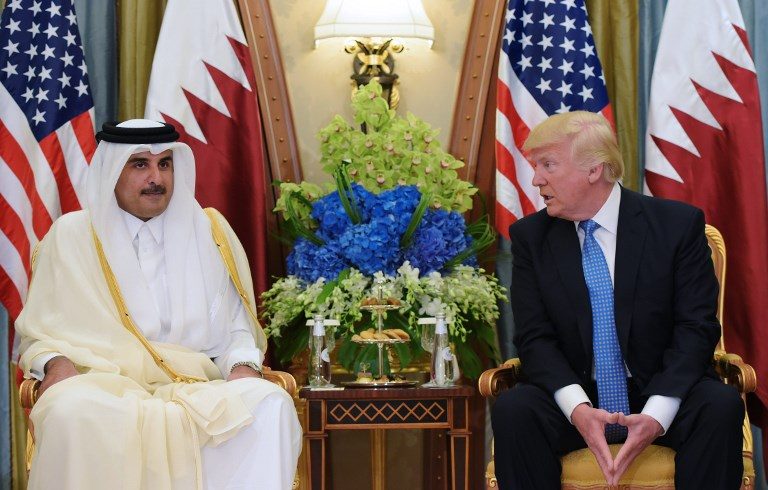SUMMARY
This is AI generated summarization, which may have errors. For context, always refer to the full article.

WASHINGTON DC, USA – In a series of morning tweets, US President Donald Trump threw Washington’s relations with Doha into deep crisis on Tuesday, June 6, and raised doubts about the future of the largest US air base in the Middle East.
Trump publicly accused key regional ally Qatar of funding extremism, while tacitly backing a blockade of the emirate, home to the Al-Udeid Air Base near Doha where around 10,000 US military personnel are stationed.
The base is also the regional headquarters of US special forces and air force commands – two vital components of American military operations in Afghanistan, Syria, Iraq and beyond.
Trump’s comments came after Saudi Arabia, the United Arab Emirates and other Gulf states broke diplomatic relations with their smaller neighbor.
The US leader appeared to claim credit for Gulf states isolating Doha, a move he said could “be the beginning of the end to the horror of terrorism!”
“So good to see the Saudi Arabia visit with the King and 50 countries already paying off,” Trump said in a morning tweet.
“They said they would take a hard line on funding… extremism, and all reference was pointing to Qatar,” he said.
Trump’s tweets mark a major departure in US foreign policy that could upend the balance of power in the Middle East, and left his administration scrambling to contain the damage.
Just weeks ago Trump smiled and shook hands with Qatari Emir Sheikh Tamim bin Hamad Al-Thani, saying “we are friends, we have been friends for a long time now.”
Pentagon spokesman Jeff Davis tried to quell concerns about the future of Al-Udeid, stressing there had been “no impact” on US military operations in Qatar “and we don’t anticipate there will be.”
Apparently contradicting Trump, spokesman Sean Spicer said the White House “wants to see this issue deescalated and resolved immediately.”
“The president had a very, very constructive conversation with the emir during his visit in Riyadh,” Spicer added.
“At that time, he was very heartened by the emir’s commitment to formally joining the terrorist financing targeting center.”
‘Real talk’
Among diplomats and former US officials there was shock that Trump would so openly pick sides in what is effectively a dispute between allies.
Previous US administrations have expressed deep concern about the hundreds of millions of dollars that flow from Qatar, Saudi Arabia and Kuwait to the likes of the Islamic State (ISIS) group, Al-Qaeda, Hamas and the Muslim Brotherhood.
But the White House has preferred to quietly coax those capitals into adopting tighter financial rules and cracking down on individual donations, while building invaluable intelligence and military cooperation.
That approach was epitomized by President George W. Bush’s approach to Saudi Arabia after the 9/11 attacks on the World Trade Center and the Pentagon. Fifteen of the 19 hijackers were Saudi citizens.
Just hours before Trump’s tweets, the US ambassador in Qatar Dana Shell Smith took to Twitter herself to stress the “great partnership” with Qatar and “real progress to counter terrorist financing.”
Aside from providing a vital base for US troops, Qatar has garnered significant regional influence, from becoming a major player in Libya to dramatically influencing the stance of the Syrian opposition.
Bob Corker, the Republican head of the Senate Foreign Relations Committee, appeared stunned when informed by journalists about Trump’s tweets on Qatar.
“Some of our Arab friends have different sensibilities relative to groups like the Muslim Brotherhood and others, and it’s created some dissension, and it’s been our policy that we work with everybody in the region in a way that’s constructive,” he responded.
But Trump’s tweets may not come as much of a shock inside the White House.
Officials say that the president and his top aide and son-in-law Jared Kushner have been impressed by Saudi Arabia’s dynamic young deputy crown prince Mohammad bin Salman, who is vying to become the country’s next king.
In Washington there are growing fears that tacit support could now embolden Saudi Arabia and the UAE to pursue regime change in Qatar or make other demands that are so punitive they will stoke a crisis.
‘Saudi-Emirati ambitions’
Saudi Arabia and the UAE have long been infuriated by Qatar’s support for the Muslim Brotherhood, for the Arab Spring which overthrew several autocratic regimes and for its tolerance of arch-rival Iran.
Al Jazeera – the Doha-based channel which has been highly critical of the Saudi royal family – has also been a thorn in their side.
“Given the vehemence in the Saudi and Emirati public statements and this history between these three countries, it may be that the Saudis and Emiratis are seeking to push out senior Qatari leaders,” said a former senior administration official, speaking on condition of anonymity because of the sensitivity of the issue.
“I worry that the United States has joined this endeavor without knowing the full extent of the Saudi-Emirati ambitions or endgame.”
The official said that given the turmoil, Qatar’s leaders may try to reassure US central command that Al-Udeid operations are secure to keep Trump from backing dramatic Saudi action.
“Fundamentally, Qatar should want to keep CENTCOM fat and happy.” – Rappler.com
Add a comment
How does this make you feel?
There are no comments yet. Add your comment to start the conversation.